While some fish are peaceful and docile, there are other aggressive ones. In the following parts, we will give you a brief overview of some most aggressive aquarium fish species, and cover the ten most aggressive freshwater fish. After reading, you will know more about aggressive fish in freshwater aquariums.
Content Table
What is the Most Aggressive Fish Species
In the case of aggressive fish, you should be prudent to introduce tank mates. Otherwise, they may bite or fight with other fish, which may cause injury. Next, we will list some aggressive fish species in freshwater and saltwater.
Aggressive freshwater fish
- Wolf Cichlid
- Jaguar Cichlid
- Red Devil Cichlid
- Arowana Fish (e.g. Silver Arowana, Asian Arowana)
- Mini Dovii
- Oscar Fish
- Jack Dempsey Fish
- Pea Puffer/Dwarf Puffer
- Piranha (e.g. Black Piranha, Red-Bellied Piranha)
- Red Tail Shark
- Snakehead Fish
- Hoplias Aimara
- Afer Knife
- Ornate Bichir
- Redtail Catfish
Aggressive saltwater fish
- Clown Triggerfish
- Lionship
- Purple Tang
- Maroon Clownfish
- Three Striped Damselfish
- Hawkfish
- Snowflake Eel
Top 10 Most Aggressive Fish in Freshwater
1. Wolf Cichlid
Wolf Cichlid is also famous as Parachromis Dovii. It can grow very large, reaching 24–30 inches. Besides, Wolf Cichlid shows aggressiveness towards other tank mates, especially during their breeding periods. In addition, the Cichlid is hard to keep in aquariums. Hence, it is not an excellent alternative for beginners.
| Family | Cichlidae | 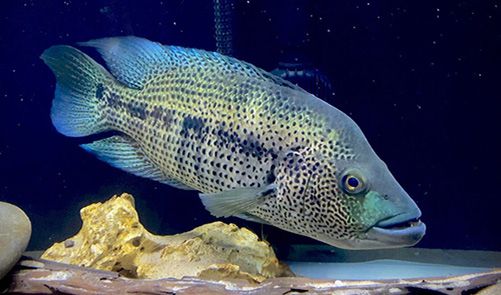 |
|
| Diet | Carnivores | ||
| Ideal water temperature | 75-82℉ | ||
| Adult size | 24–30 inches | ||
| Lifespan | 24–30 years | ||
| Minimum tank size | 125 gallon | ||
2. Jaguar Cichlid
Jaguar Cichlid is a large fish with an elongated body. It is hardy. Therefore, it can adapt to a wide range of water conditions. Just check water conditions regularly and maintain a comfortable living environment. Jaguar Cichlid would stay in good health. However, this Cichlid is more suitable for experienced aquarists. As it is aggressive and large.
| Family | Cichlidae | 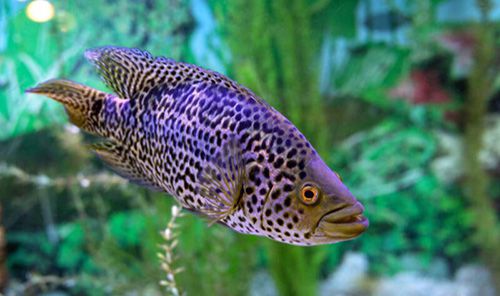 |
|
| Diet | Carnivores | ||
| Ideal water temperature | 73-82℉ | ||
| Adult size | 16–24 inches | ||
| Lifespan | 15 years | ||
| Minimum tank size | 70 gallon | ||
3. Oscar Fish
Oscar fish are also known as Tiger Oscar, Marble Oscar, Velvet Cichlid, or others. They are from tropical areas, along with slow-moving waters. Though they are aggressive and large, they can be a great option for beginners. Because they are hardy and easy to care for. Nonetheless, you should also meet their care requirements, such as adequate space, warm water temperature, and great water quality.
| Family | Cichlidae | 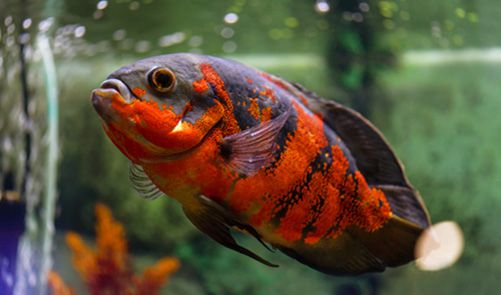 |
|
| Diet | Omnivores | ||
| Ideal water temperature | 74-81℉ | ||
| Adult size | 12–18 inches | ||
| Lifespan | 10–20 years | ||
| Minimum tank size | 55 gallon | ||
4. Arowana Fish
Featuring long bodies, Arowana fish are from Africa, Asia, South America, and Australia. They prefer slow-moving, warm, and acidic waters. Moreover, they are aggressive toward other fish, especially fish smaller than themselves. Furthermore, holding an Arowana fish in an aquarium can be challenging. Usually, you should make sure of adequate space, keep great water conditions, build a great filtration system, and maintain an ideal oxygen level. Also, it is best not to hold more than one adult Arowana in the same tank. If you want to learn more about care guides for Arowana fish, you can read Guide to Take Care Arowana Fish.
| Family | Osteoglossidae | 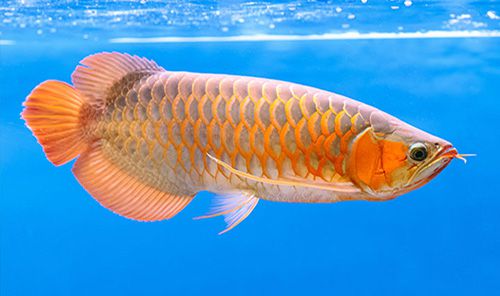 |
|
| Diet | Carnivores | ||
| Ideal water temperature | 75-86℉ | ||
| Adult size | 2–3 feet | ||
| Lifespan | 10–15 years | ||
| Minimum tank size | 250 gallon | ||
5. Piranha
Piranha possesses a colorful body, including silver, orange, and black colors. Actually, fish size depends on the species. Generally, Piranha can grow up to 5–14 inches. But the red-bellied piranha can reach 20 inches. Besides that, Piranha has sharp teeth, which poses the possibility of strong biting abilities.
| Family | Serrasalmidae | 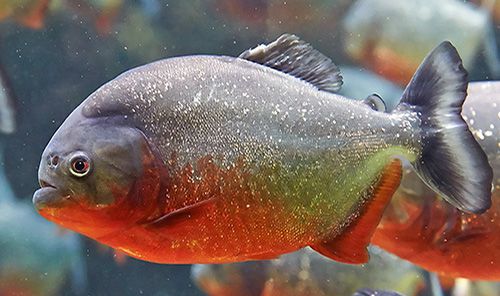 |
|
| Diet | Omnivores | ||
| Ideal water temperature | 76-83℉ | ||
| Adult size | 5–14 inches | ||
| Lifespan | 10 years | ||
| Minimum tank size | 55 gallon | ||
6. Red Tail Shark
Featuring a pointed snout, triangular dorsal fin, and red tail, Red tail sharks are aggressive. Commonly, they prefer staying at the bottom of the aquarium and hiding in dark places. As a result, you should provide adequate hiding places in your aquarium. Additionally, Red tail sharks are fond of fast-moving waters. Consequently, you can add a wavemaker pump with a strong current.
| Family | Cyprinidae | 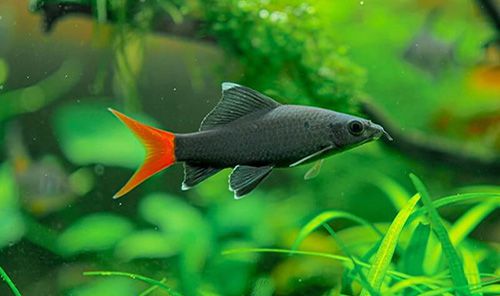 |
|
| Diet | Omnivores | ||
| Ideal water temperature | 72-79℉ | ||
| Adult size | 6 inches | ||
| Lifespan | 5–8 years | ||
| Minimum tank size | 55 gallon | ||
7. Red Devil Cichlid
With pointed anal and dorsal fins, Red Devil Cichlids can swim faster in the water. In general, the Cichlid comes in red, yellow, or white colors. Also, the Red Devil Cichlid is hardy. But it does not mean that it is feasible for beginners to keep in aquariums. Because the Cichlid does need your careful maintenance to keep healthy. Otherwise, it may face death.
| Family | Cichlidae | 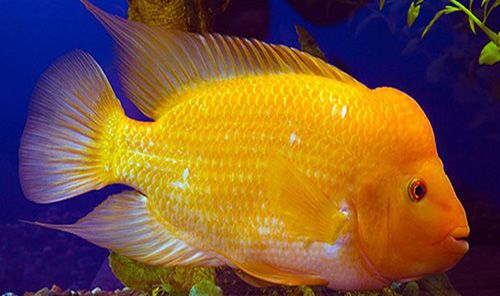 |
|
| Diet | Omnivores | ||
| Ideal water temperature | 70-79℉ | ||
| Adult size | 8–10 inches | ||
| Lifespan | 10–12 years | ||
| Minimum tank size | 55 gallon | ||
8. Dwarf Puffer
Dwarf puffers are small, also named Pea puffers. They have a light green body with black spots. Besides, Dwarf puffers are aggressive, sensitive, and active. As a result, it is better to keep them alone in one aquarium. Additionally, they need great water quality and stable water parameters. By the way, you can learn more about dwarf puffers and other puffer fish in this article – Most Popular Types of Freshwater Puffer Fish.
| Family | Tetraodontidae | 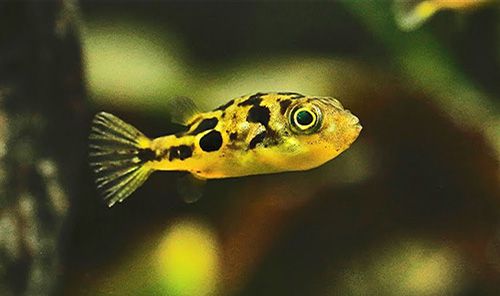 |
|
| Diet | Carnivores | ||
| Ideal water temperature | 74-82℉ | ||
| Adult size | usually less than 1.5 inches | ||
| Lifespan | 3–4 years | ||
| Minimum tank size | 10 gallon | ||
9. Jack Dempsey Fish
Jack Dempsey fish have a compressed body, which is oval to rectangular. They are native to tropical areas and slow-moving waters. According, you may need to add an aquarium heater to maintain the warm water in your tank. Aside from that, aquariums with plenty of hiding places will gain their favor. Because sometimes they like to hide in caves or other places.
| Family | Cichlidae | 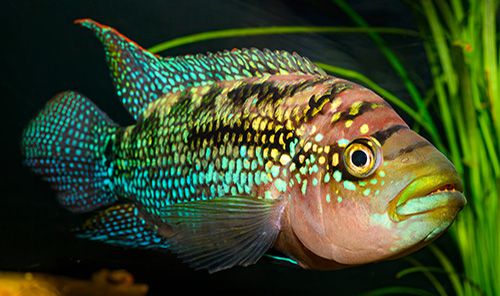 |
|
| Diet | Carnivores | ||
| Ideal water temperature | 72-86℉ | ||
| Adult size | 7–8 inches | ||
| Lifespan | 10–15 years | ||
| Minimum tank size | 55 gallon | ||
10. Redtail Catfish
In the wild, you can find Redtail Catfish in freshwater large streams, rivers, or lakes. Usually, in captivity, they just stay at the bottom of the aquarium. Also, they are active at night. Accordingly, you’d better feed them at night. Aside from that, it is recommended to provide a larger aquarium, seeing that they can grow fast and can reach 3–4 feet when they are an adult.
| Family | Pimelodidae | 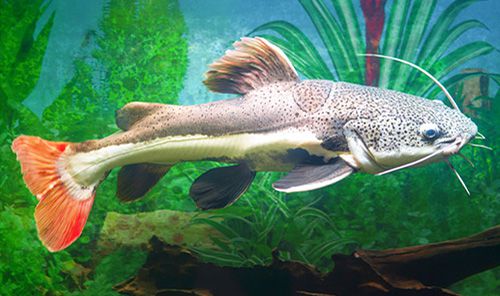 |
|
| Diet | Omnivores | ||
| Ideal water temperature | 68-80℉ | ||
| Adult size | 3–4 feet | ||
| Lifespan | 15 years | ||
| Minimum tank size for adult one | 1500-2000 gallon | ||
Conclusion
In short, most aggressive freshwater fish should be kept alone. While some can be kept with other fish species. Take Oscar fish as an example, you can introduce Convict Cichlid, Blood Parrot Fish, and Jewel Cichild to an Oscar fish aquarium. However, no matter what aggressive fish species you want to keep in your tank, it is better to learn about their character and requirements first.
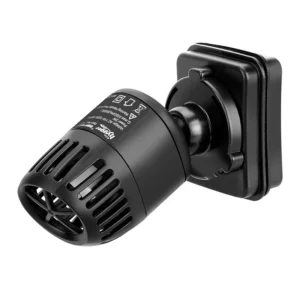

Leave a comment